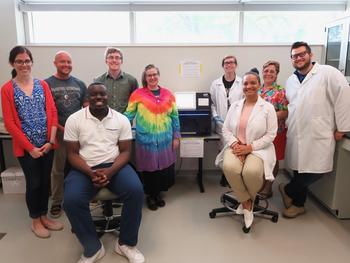
A pair of UNC Pembroke biology students spent their summer researching wild plant extracts and its effect on aging.
Dontae Mosely and Ashley Edwards spent 20 hours a week testing extracts from wax myrtle and rabbit tobacco on Caenorhabditis elegans–tiny, microscopic worms commonly known as C. elegans.
Dr. Courtney Carroll, an assistant biology professor, formed a biomedical research team using funds from the university’s RISE program and sponsored research grants.
Carroll, Mosely and Edwards worked in collaboration with Dr. Conner Sandefur, a fellow department colleague. Mosely, a senior, is a RISE Fellow and a biotechnology major. Edwards, a sophomore, is a double major in biochemistry and music.
"I started the biomedical research project coming from a background in aging and diseases associated with aging, specifically neurodegenerative disorders,” Carroll said. “In general, we wanted to study what we can do to live longer, healthier lives.
“Aging-related disorders is among the leading killers out there, not just neurodegenerative disorders, but cardiovascular disorders and cancer. All of which have an aging component. We are looking at interventions that can be done to help that process.”
C. elegans are nematodes commonly used as models for aging. The worms have a lifespan of two weeks, making them easy to manipulate genetically.
With the help of Sandefur, the group studied the effect of native plant extracts on longevity to determine whether they can increase lifespan or improve aging in the worms.
“We found that one of the plants seems to have a beneficial effect on lifespan. So, these worms are living about five to 10 percent longer. A few of the other plants are helping with their muscle function. The worms may not live longer, but they are able to maintain their motor skills for more of their life.”
“When I was eyeing a career in working with undergraduate students, I wanted to make sure I had a system that could get them involved with the research because that is where the learning happens. The passion for science comes from doing the project yourself.”
The group will continue their research this fall.